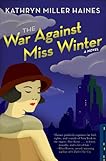 Mysteries have so many sub-genres that it is impossible to classify many of the books. I enjoy historical mysteries but with reservations - I generally don't read stories that happened more than two hundred years ago - a personal preference. If there is a time period I lean towards it is the 1920-1940s. I love World War books. And Haines story is a quintessential World War II Americana story. I have also found that I really enjoy reading the first mystery in an ongoing series. I am intrigued to see how an author crafts the world for a repeat character who will be solving crimes again and again.
Mysteries have so many sub-genres that it is impossible to classify many of the books. I enjoy historical mysteries but with reservations - I generally don't read stories that happened more than two hundred years ago - a personal preference. If there is a time period I lean towards it is the 1920-1940s. I love World War books. And Haines story is a quintessential World War II Americana story. I have also found that I really enjoy reading the first mystery in an ongoing series. I am intrigued to see how an author crafts the world for a repeat character who will be solving crimes again and again.I met Haines at a book signing when The War Against Miss Winter first appeared and I chose not to buy the book. I don't remember my logic at the time. Most likely it had more to do with more growing stack of 20 plus books that I had already bought than any particular disinterest in her book. Anyway, my mom bought the book instead, read it, and passed it on to me. And I'm glad she did.
Haines, an actor, sets up the story of a down and out actor who works for a private eye in World War II New York. Familiar with the genre of the era, Haines uses a lot of slang. It gives the story authenticity and a film noir feel. However, there are points when I feel like Haines overdoes the jargon. There are times when it is fine to say "walking" rather than repeat "legging" for the tenth time. Haines has also done her homework. She depicts the life of civilians during the War well quoting propaganda posters frequently to demonstrate the emotion being supplied to the Americans by the government. The world of chorus girl, hopeful actresses gives the story another level of intrigue. Haines uses famous plays for the title of each chapter and quotes Shakespeare from time to time adding to the character's believability but also giving credence to Haines' background.
The crux of the story revolves around a missing play and a dead playwright. If you read carefully Haines lays out exactly what the solution to the mystery is - although the whodunit is less straight forward. But she crafts the plot well enough that it is not overly obvious rendering the book unpalatable.
I have the second installment of the Rosie Winter saga waiting for me on my bookcase. I will happily dive into it one of these days. The gumshoe, "long-legged dame" feel is a light sub-genre that I don't read frequently and probably would not pick up first. But I enjoy the time period and the main character enough to absorb the style for what it is.
No comments:
Post a Comment